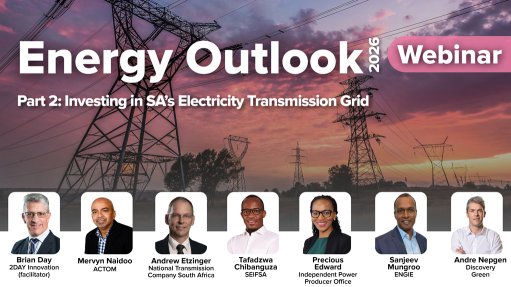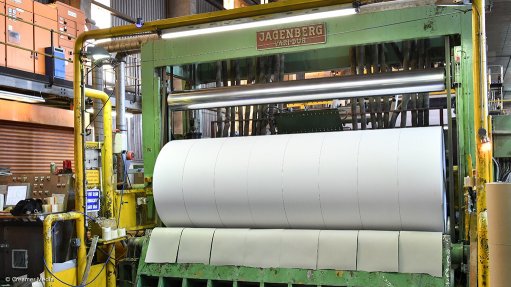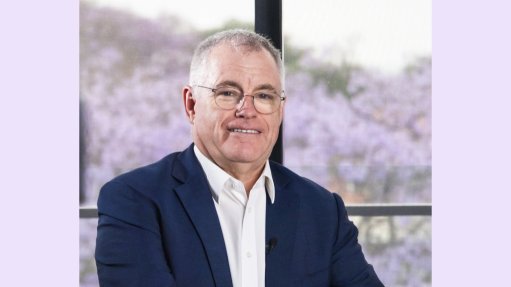Coega Development Corporation adopts sustainability framework
The board of industrial park management agency the Coega Development Corporation (CDC) has adopted a sustainability framework that will guide the organisation’s projects, investments and operations.
The framework is a policy statement of its commitments to sustainability, which will be measured against environmental, social and governance (ESG) outcomes.
"In this framework, we are committed to being a good corporate citizen and responsible investor, so we bring along our investors on our sustainability journey by ensuring they make policy commitments to sustainability and start producing sustainability reports," chief sustainability officer Telly Chauke said on December 6.
Further, the framework commits the CDC to driving a just energy transition, combatting climate change and supporting climate resilience within its own operations, those of its tenants and stakeholders, such as local communities.
Another aspect of the framework is to infuse its decision-making and investment processes with climate science, and to support greater flows of funding to investments in low-carbon technologies, she said.
The Coega Special Economic Zone (SEZ) operator has produced sustainability reports over the past three years as part of its yearly performance reporting, and has reduced waste generated and electricity consumed, but has seen an increase in water consumption, mainly linked to new investments for new tenants, she said during a briefing on its past financial year.
"Our sustainability permeates through our investment portfolio and our overall value proposition. If we are financially sustainable, we are able to drive environmental and social sustainability in our own operations, projects and services, as well as supporting our tenants, partners and communities to adopt sustainability best practices."
The company has reduced the waste it and its tenants produce by encouraging good practices, including by reducing consumption that leads to waste, such as the use of unnecessary packaging, and promoting recycling.
"Through the programme, we aim to influence our partners, stakeholders and investors to look at the types and amount of waste they generate and to look at alternative ways of reducing and managing waste.
"We are planning, in the coming years, to develop a co-disposal facility that will manage hazardous and general waste, in addition to offering alternative ways to treat waste. We are also looking into the feasibility of offering these services to the broader [Nelson Mandela Bay] area as well," Chauke said.
Meanwhile, the CDC is working towards the financial close of its initial plan to install 4.5 MW of solar photovoltaic systems on its rooftops. It plans to start with five buildings and then expand this project to a further 20 buildings over the next few years, she noted.
The primary aim of this solar rooftop project was to improve security of electricity supply.
The CDC aims to use its resources to play its part in the country's broader just energy transition.
Coega is also assessing the potential of gas-to-power generation, and to use gas as a transition fuel, she added.
Meanwhile, the company is considering investing in water reuse systems to improve the security of water supply for tenants.
"Our plans include looking to diversify our water resources, reuse industrial water and reduce our consumption of surface and ground water. These are some of the initiatives we are starting to invest in more in the CDC," Chauke said.
The region is in the grip of its worst drought in seven years, and this has to be dealt with by all stakeholders and by augmenting supply and managing demand.
To this end, Coega is helping the Nelson Mandela Bay metropolitan municipality with its war on leaks and the CDC is actively looking for funding from the national fiscus for a 15 Mℓ/d desalination plant.
However, demand also had to be managed, which required a change in behaviour from all stakeholders, including how companies and individuals used water, she emphasised.
The CDC regularly holds stakeholder engagement meetings with local communities, including to engage with local small, medium-sized and microenterprises, and also provides information to communities on good practices in terms of water conservation and use.
"We are sharing knowledge to entrench good practices in terms of water conservation. Further, we are also looking to establish and develop a space for the manufacturing of water-related technology components at an industrial scale in the SEZ," Chauke added.
The CDC would also, during the current financial year, wrap up its carbon footprint analysis that will establish what its emissions are, in terms of its current practices, and then determine its emissions trajectory into the future, she said.
"We want to, in the coming year, set emissions reduction targets and start looking at our holistic emissions, including how we manage and treat waste, and consume water and energy in the SEZ and in our external projects, operations and services.
"Our Scope 1 and 2 emissions remain high, particularly owing to the energy-intensive activities of our tenants. They are part of the group that we are working with to support actions to reduce emissions," she noted.
The CDC's sustainability objectives require that it looks at all aspects of sustainability, including from design and procurement to construction and operation.
"It is critical that projects be front-loaded with ESG processes and objectives to ensure we can get them to financial closure, and that meet our sustainability commitments, which support the United Nations Sustainable Development Goals.
"Coega is looking to incorporate ESG principles in our projects and operations going forward, in response to market pushes and as we implement our sustainability objectives and raise our sustainability goals," Chauke said.
Article Enquiry
Email Article
Save Article
Feedback
To advertise email advertising@creamermedia.co.za or click here
Comments
Press Office
Announcements
What's On
Subscribe to improve your user experience...
Option 1 (equivalent of R125 a month):
Receive a weekly copy of Creamer Media's Engineering News & Mining Weekly magazine
(print copy for those in South Africa and e-magazine for those outside of South Africa)
Receive daily email newsletters
Access to full search results
Access archive of magazine back copies
Access to Projects in Progress
Access to ONE Research Report of your choice in PDF format
Option 2 (equivalent of R375 a month):
All benefits from Option 1
PLUS
Access to Creamer Media's Research Channel Africa for ALL Research Reports, in PDF format, on various industrial and mining sectors
including Electricity; Water; Energy Transition; Hydrogen; Roads, Rail and Ports; Coal; Gold; Platinum; Battery Metals; etc.
Already a subscriber?
Forgotten your password?
Receive weekly copy of Creamer Media's Engineering News & Mining Weekly magazine (print copy for those in South Africa and e-magazine for those outside of South Africa)
➕
Recieve daily email newsletters
➕
Access to full search results
➕
Access archive of magazine back copies
➕
Access to Projects in Progress
➕
Access to ONE Research Report of your choice in PDF format
RESEARCH CHANNEL AFRICA
R4500 (equivalent of R375 a month)
SUBSCRIBEAll benefits from Option 1
➕
Access to Creamer Media's Research Channel Africa for ALL Research Reports on various industrial and mining sectors, in PDF format, including on:
Electricity
➕
Water
➕
Energy Transition
➕
Hydrogen
➕
Roads, Rail and Ports
➕
Coal
➕
Gold
➕
Platinum
➕
Battery Metals
➕
etc.
Receive all benefits from Option 1 or Option 2 delivered to numerous people at your company
➕
Multiple User names and Passwords for simultaneous log-ins
➕
Intranet integration access to all in your organisation


















